The National Adaptation Readiness and Preparatory Support for Building Flood Resilience Capacities in Rwanda approved in January 2020, building on current measures, strategies and policies, will coordinate different government agencies and targeted multi-stakeholders for effective flood and landslide planning and prevention in Rwanda’s most vulnerable zones.
As the COVID-19 pandemic has swept through much of the world, the role of Readiness can also be seen in the context of its ability to empower mutually reinforcing action that addresses both the pandemic and climate change. Readiness is well suited to help support developing countries carry out a climate-resilient recovery to COVID-19.
The GCF Readiness programme strengthens developing countries’ institutional capacities, governance mechanisms, and planning and programming frameworks that lead to a transformational long-term climate action agenda. It does this through grants or technical assistance. Readiness also assists in the development of innovative project pipelines for GCF and other climate financial institutions. As one of GCF delivery partner , the Global Green Growth Institute assists National Designated Authorities (NDAs) in developing and implementing the Readiness Programme. GGGI also helps to expand funding windows for developing countries to directly access GCF funds by supporting the accreditation of national Accredited Entities. GGGI works with these organisations to develop concept notes and funding proposals to submit to GCF for inclusion in its portfolio of climate finance projects.
Rwanda is undergoing rapid urbanization as one of its main economic growth and transformation drivers, while risks from climate change continue to pose a challenge. Although there have been past and on-going interventions in the area of building climate resilience and adaptation, limited, if any, activities focus on interventions related to urban and the built environment.
The GCF NAP Readiness proposal development went through a robust consultative process through engagement of stakeholders both at the sector and ministry levels. The GCF approval to the proposal was on January 26, 2020 and communicated to the NDA –Rwanda Environmental Management Authority and Delivery partner on January 31, 2020. Project implementation kicked off in March with setting up the modalities of project management set up, recruitments, stakeholders’engagements and project working groups with the different institutions involved.
The GCF NAP Readiness has the following outcomes:
Outcome 1: Capacity and coordination strengthened for main institutions to effectively mitigate floods and prevent landslides.
Outcome 2: Appropriate technical studies identified and prioritized, climate finance strategies and project pipeline strengthened for effective storm water and landslide management in Kigali City and urban areas experiencing rapid growth and highly vulnerable to floods and landslides outside Kigali city.
Outcome 3: Knowledge management, information sharing, and communications strengthened to effectively mitigate floods and prevent landslides.
Outcome 4: Mechanisms for Reporting, Monitoring and Review of adaptation and resilience planning progress developed to gather lessons and integrate them into future iterations of the identified flood mitigation and landslide management planning process.
Building on the results of previous GCF Readiness Support to implement Green City Development Projects in Rwanda’s Secondary Cities, there is an urgent need to capacitate the project and program planners as well as the last mile implementers and beneficiaries to understand and integrate climate resilient development in their daily work. The adopted Green Building Minimum Compliance System supports the realization of low carbon urban development promoted by the revised master plans of the secondary cities. This system and related requirements need to be embraced, understood and applied by practitioners and investors.
This project seeks to increase the capacity of Rwanda Government’s Environment and Natural Resources (ENR) Thematic Sector Working Groups (TSWGs) with a focus on strengthening their functions and activities to inform sub-national level actors on green growth and climate resilience that will lead to the delivery of climate actions in their respective sectors, subsectors, and communities. The project’s outcomes and outputs benefit the critical mass of society whose role is to implement government policies, strategies and projects on the ground. The overall results will lead to successful implementation of key national strategies and plans including the Seven Year Government Programme: National Strategy for Transformation (NST1, 2017/2024), Sector Strategic Plans (SSPs, 2018/2024), District Development Strategies (DDS, 2018/2024) and the Green City Development Master Plans (2019-2050). These strategies and plans are aligned with the Green Growth and Climate Resilience Strategy (GGCRS) and Nationally Determined Contributions (NDCs) to stimulate green economic development and green investment in Rwanda’s secondary cities and others emerging urban centres.
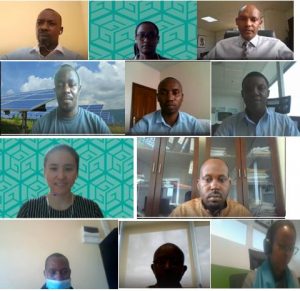
A virtual joint kick-off meeting was held on 18th June 2020 for both GCF NAP and GCF Readiness Support Project
to consolidate preliminary feedback from key stakeholders and partners on implementation. It was a successful online meeting with participants from MoE, MININFRA, MINEMA, MINALOC, MINAGRI, MINECOFIN, MINICOM ,REMA, RWB, Meteo Rwanda, RNP, RTDA, RHA, LODA, GMO, FONERWA, RDB, PSF, NIRDA-CPCIC ,World Bank, NDF, ENABEL, ICLEI ,City of Kigali, Secondary Cities, Districts ,UR, RAPEP, RIA, IER ,RISD, Rwanda Women Network and more.
In his opening remarks Faustin MUNYAZIKWIYE-Deputy Director General of REMA said the “GCF NAP project is crucial as it will enhance Rwanda’s Capacity to respond to Climate Change impacts in high risk zones by implementing an integrated floods and landslides management in Urban areas. Developing the capacity of the National Designated Authority (NDA which is REMA) and related institutions, strengthening the coordination with relevant stakeholders to plan and respond to the most urgent needs for mitigating the climate induced risks and hazards (floods and landslides)

Faustin MUNYAZIKWIYE
Inhee Chung-GGGI-Rwanda Country Representative pointed out that the “GCF Readiness Project picks up from the first Readiness completed in July 2019, and explained that for the second readiness project, we shall reach the grassroots levels and that the participants inputs and guidance is of key importance”

Inhee Chung
Liliane Uwanziga MUPENDE-GCF NAP Project Coordinator at GGGI-Rwanda Country Program provided context of the existing situation on Floods and Landslides risk management. She explained the increasing frequency of extreme weather events in Rwanda including flooding, landslides resulting in loss of lives and properties with social and economic cost significantly impacting the community.
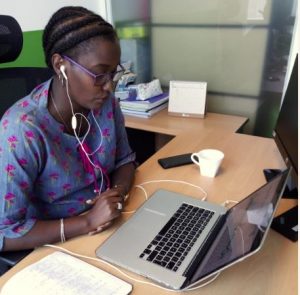
Liliane Uwanziga MUPENDE
Jean Pierre Munyeshyaka – Senior Associate – Green Urbanization Specialist , elaborated on the GCF Readiness Project that complements the initial Readiness completed in July 2019 which focused mainly on Green Urbanization and/or the built environment with emphasis on how Secondary Cities can be developed as Green City Models. This 2nd Readiness Project therefore is tailored to capacitate Rwanda’s Sub-National Level actors in Green Growth and Climate Resilience.

Jean Pierre Munyeshyaka
Herman Hakuzimana, Director of Climate Change and International Obligations Unit-REMA ,presented the linkages between the projects and the updated National Determined Contributions, indicating that both projects were elaborated based on the GGCRS and recently updated NDC’s. He provided a brief background and overview of the Rwanda NDC’s commencing with the call for Countries party to the UNFCCC to submit INDC’s following the adoption of the Paris Agreement at the COP 21. This would present key actions intended to be undertaken to mitigate and adapt to Climate Change. Revised NDC’s were to be submitted by 2020 prior to COP 26, now scheduled for December 2021 in Glasgow, UK.
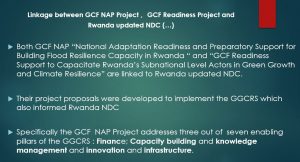
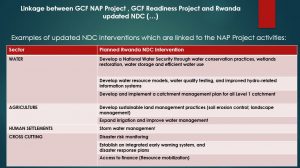
Key aspects were highlighted as critical to the way forward:
1) Need for close collaboration and extensive coordination with various institutions and stakeholders with the need for ownership by all;
2) Sharing of detailed information with all key stakeholders and continued consultation throughout the project starting with the projects detailed activity plans and expectations from the stakeholders.
Rwanda’s built environment is susceptible to floods ,landslides that require effective storm water & landslide management in City of Kigali and urban areas. The National Adaptation Plan project team including GGGI Rwanda ; City of Kigali ; Rwanda Water Resource Board ; Local government ; REMA and Ministry of Environment have conducted site visits during the month of July & August 2020. A technical assessment was done in Mpazi Sub-catchment to assess measures required to build resilience to flood mitigation & landslide prevention ; Rwandex-Magerwa was assessed for measures to build resilience to floods & landslides.
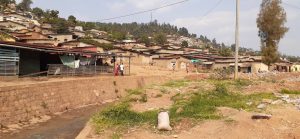
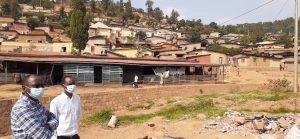
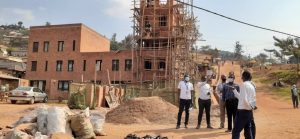
on August 21 , 2020 the GCF NAP project team conducted site visit to assess the sectors of Runda and Rugalika in Kamonyi District that feed into the Bishenyi catchment area. The team identified site extent & scope of the study that will be addressing floods and landslides.
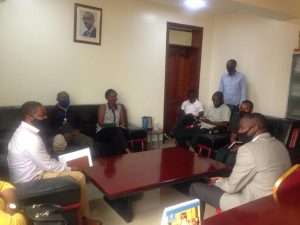
GCF NAP team meet with Ag May of Kamonyi District
To follow the latest news and developments of GCF Readiness programme in Rwanda:
1.Read the GGGI-GCF partnership , on enhancing access to climate finance through readiness support
2. Watch the NDA introduction to Green Climate Fund (GCF) Readiness and Preparatory Support Project in Rwanda
3. Watch the 2019 Rwanda –GCF Readiness & Preparatory Support Project Closure Workshop video
4. Read the full technical report on Achieving Green Growth and Climate Action post COVID-19